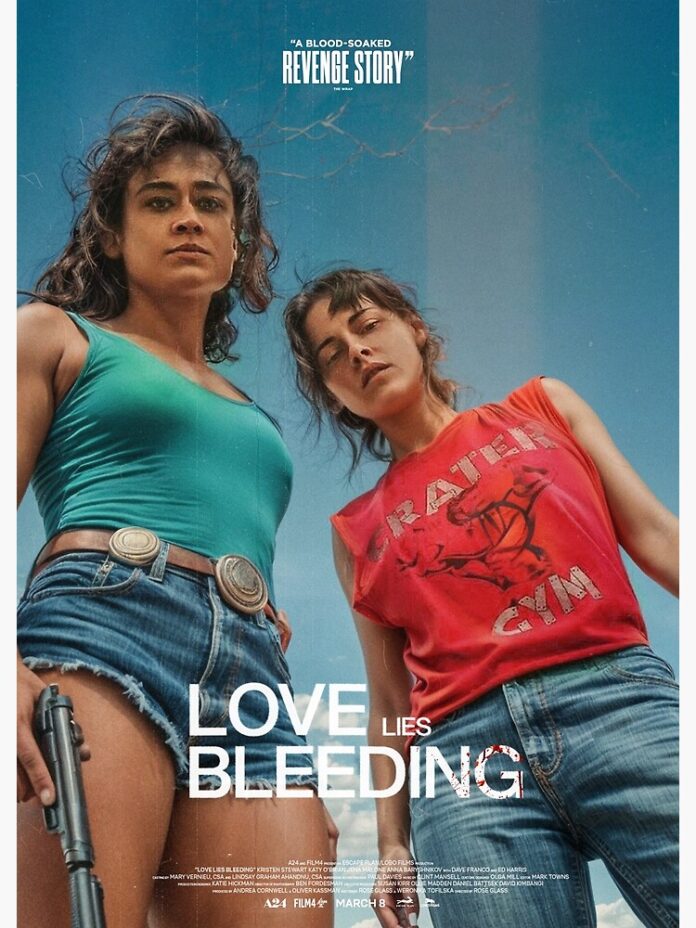This A24 film will make you question the unimaginable boundaries of love and violence
By INDRANIL BASU — arts@theaggie.org
“Love Lies Bleeding” is a 2024 romantic thriller film directed by English filmmaker and screenwriter Rose Glass, co-written by her and Weronika Tofilska. Glass’ second feature film after “Saint Maud” (2019) is a co-production between the United Kingdom and the United States, developed by A24 and Film4. It had its world premiere in the Midnight section at the 2024 Sundance Film Festival on Jan. 20 and was released in the U.S. last month on March 8 to mostly positive reviews.
The ASUCD Entertainment Council held a free screening of the film on campus on April 11 at Cruess Hall. They advertised the film on Instagram as “a shocking Stranger Things turned vecna-gymbro-monster” flick, which is pretty accurate. The theater of room 1002 was quite filled, with a lot of queer and/or sapphic students showing up for the film with great anticipation, making the experience even more exciting and communal.
Set in a small town in New Mexico in 1989, the film tells the story of Lou, an introverted gym manager, played by queer icon Kristen Stewart, who falls in love with Jackie, an itinerant, buff bodybuilder, played by Katy O’Brian in her first lead role.
Lou is a butch lesbian with the aesthetic of a contemporary teenage boy, whereas Jackie is a more androgynous bisexual, both depicted aptly through their costumes designed by Olga Mill.
Their sapphic love story starts with a series of steamy sex scenes which elicited great cheer from the audience. The filmmakers and actors are clearly authentic to the sapphism of the film, the camera framing them with empathy and capturing the affectionate intimacy in their lust. The script gives them vulnerability and space to talk about each other’s bodies, which, coupled with the sex scenes, makes them more cherished, beautiful and organic.
The film follows several canon events of sapphic relationships with its own twists, making the queer audience identify and respond to them yet shocking them at each turn of the story. It appears to be a small-town love story — especially with the setting of Lou’s small apartment, the constricted men-dominated gym and the contrast of Jackie’s immediate aspirations with Lou’s reclusiveness. It’s not until Lou’s sister’s hospitalization due to extreme domestic violence that Jackie is sucked into Lou’s family’s harrowing criminal affairs.
The film has brilliant cinematography by Ben Fordesman, editing by Mark Towns and a palpable score by Clint Mansell, which together intensify the story considerably beyond its plot.
Ed Harris as Lou Sr., Lou’s estranged father and weaponry crime lord, looks more formidable than Voldemort, even without any special effects makeup. Jena Malone as Beth, Lou’s sister as the tragic victim of domestic violence, Anna Baryshnikov as Daisy, a femme sapphic who pursues an irritatingly one-sided love interest in Lou and Dave Franco as J.J., Beth’s husband and the insidious-looking perpetrator, deliver equally brilliant performances.
The writers do a genius job of characterizing each and every role as people we might know in real life but capable of unimaginable harm, making them all the more monstrous and surprising to the audience. Their complexity makes the film narratively rich and deeply thrilling.
Although it does place love at its core, the film turns violently from its genre of romance into that of thriller, jolting the audiences and subverting their expectations of what this thriller would deliver. In their signature style, A24 brings the flavor of independent cinema with its niche story (or rather niche twist on a popular plot), strong aesthetics and convention-defying narratives.
As the film went on, its “lying” twists and “bleeding” turns made the audiences cry out versions of “what the hell is happening?” The film’s many close-up shots of bloody and violent gore or surreal body horror contrast with the sequences of starry night skies of the New Mexican landscape, shots of cuddling and making breakfast for one’s lover. The film ultimately triumphs in its surreal euphoric return to sapphic love despite violence.
This is the question the film seems to explore: what is love? What are its boundaries? And what happens when those are tested by such violence? Along with dilemmas of family, romantic relationships and their transgressive violations, the film is as entertaining, weirdly cathartic and mythological as it is complicated and murky. It definitely left everyone at the screening wondering what to make of it or even where to start processing what they saw.
For watchers, leaning into the movie’s sapphism and not personally questioning its narrative until later is probably the best way to approach this genre-defying film. “Love Lies Bleeding” is playing in theaters now.
Written by: Indranil Basu — arts@theaggie.org






